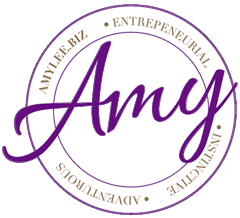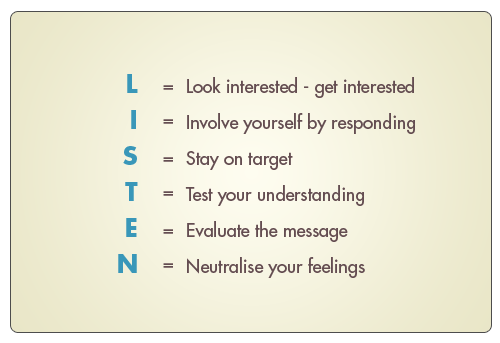Four months ago, I attended a workshop called “Active Listening… The Key to Successful Communication Outcomes,” facilitated by Sandy Chernoff. It was a learning experience as I have never given “listening” that much importance before. I’d like to share with you the notes I took down.
- – Only 7% of what we say is verbal; 38% is tonal. Fifty-five percent is non-verbal or the body language.
- – Hearing is an ability; listening is an art. To be an effective listener, we should use our ears, our eyes, our heart and our mind
- – Don’t assume that all our listeners will understand all what we are saying.
- – Check to make sure that the message we are sending is the one our listeners are receiving; that the real message is what is received and understood by our audience and not the one that we sent.
- – We need to listen to be people magnet
- – We speak at the rate of 150 – 175 words per minute. And our mind processes 800 words per minute.
- – We can NOT listen & talk at the same time. To listen, we need to stop talking. We have 2 ears and 1 mouth so that we should listen twice as much as we talk.
- – The only time we stop someone from talking is to CONFIRM or SUMMARIZE what s/he has said so far.
-
- TO LISTEN means….
- to receive the information unfiltered. This means that we take the message the way it is and not color it with our views.
-
- to “get” the message, meaning, to understand it and process it appropriately
- to respond appropriately to the message
- to listen to the intent of the speaker in order to determine the best response
- The three listening modes:
- Competitive / Combative
- – a person in this mode is self-centered
- – he is waiting to attack
- – he pretends to be paying attention
2. Passive / Attentive
- – this person is genuinely interested in what we are saying
- – this person makes the speaker assumes that he “got it”
- – this person does not verify or ask for clarification
3. Active / Reflective (best category)
- – Most effective listener
- – He is genuinely interested
- – He actively summarizes what he has heard to confirm his understanding of it
- Roadblocks to listening:
1. advice – the listener likes to jump in and give advice before the speaker finishes talking- 2. advice stated as a question – the listener likes to interrupt the speaker to ask if he has done something related to what he is talking about. For example, the speaker is talking about being depressed and the listener interrupts by asking if he has seen a psychiatrist.
- 3. Reassurance – the listener gives the speaker reassurance that he is okay even before he finishes what he wants to say
- 4. Criticize – this listener, on the other hand, has the habit of criticizing while the speaker is in the middle of his talk
- 5. Related stories – this listener interrupts the speaker by talking about something else
- 7. lack of eye contact
- 10 tools to effective listening:
– Stop talking
– Put the speaker at ease
– Show the speaker that you want to hear them
– Remove distraction
– Empathize
– Be patient
– Watch your own emotions that may distract the speaker from what he wants to say
– Try not to criticize, argue or disagree
– Ask questions for clarification
– Be a non-judgmental listening- More on LISTENING
- – Pay attention to non-verbals
– Listen to the speaker’s point of view
– Respect the speaker
– Don’t jump to conclusion - More on Active LISTENING:
- – Hear
- – Interpret
- – Respond
- – Evaluate


Ah yes, takes me back to my college days. I don’t know which class it was or if it was several classes but I feel like I just sat through part of a college lecture again. Well put together workshop I would say.
Yes, indeed. It’s now that we realize that we missed learning because we were not listening or we were not in class at all. Thank God I had that opportunity again to finally learn.
Thanks, it’s been some time since I had the opportunity to refresh on the subject, very helpful, much needed, again THANKS!!!